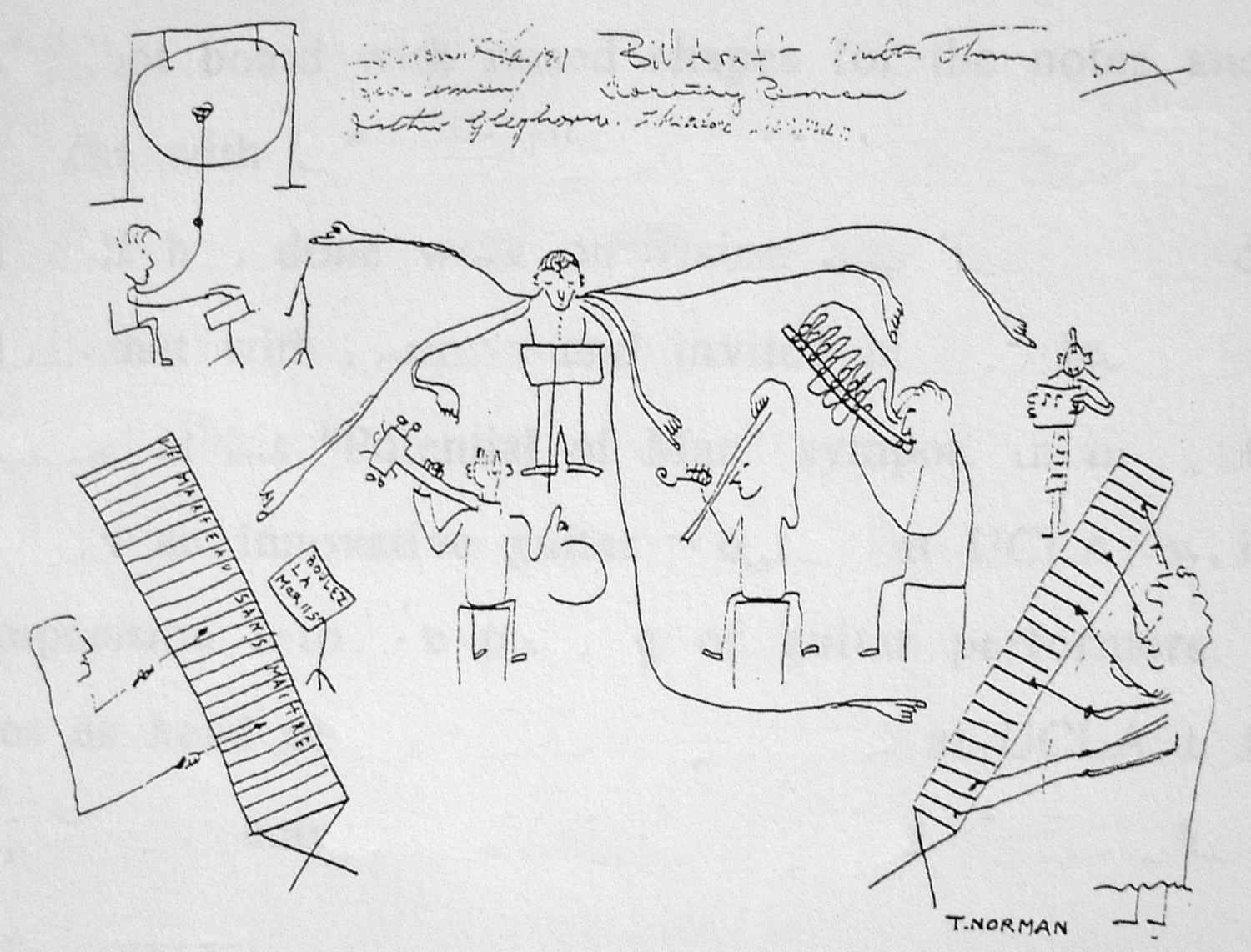The word alap refers to the opening passage of Raga music. In the music of India, the alap tends to display improvisational materials which relate to the music which will follow, yet it contains a deep expressivity. In the work Grand Alap, the opening passage serves as a kind of ritual offering to all surrounding spirits and is a request for permission to begin the performance. This practice has occurred in the music-making practices of cultures throughout parts of Asia for many centuries, including Cambodia. The subtitle ‘A Window in the Sky’ is a reference to the recent scientific discovery of hundreds of newly found galaxies (with the assistance of the Hubble telescope) and perhaps relates to the expository quality of the work, and its expansiveness.
Grand Alap requires the percussionist to be male and the cellist to be female, as each of them has a vocal part which is both separate and related to their instrumental parts. Each of them is required to articulate certain phonemes as well as to sing. Some of the phonemes used are derivative of the sounds used to communicate percussion techniques in regions of South and Southeast Asia while others resemble words in a few ancient languages. A few words have meaning in the Khmer (Cambodian) language, which derives from Pali and Sanskrit: ‘Soriya’ is the sun, ‘Mekhala’ is the goddess of water, and the words ‘Mehta/Karona’ refer to the concept of greater compassion.
Grand Alap consists of countless fragments strung together like beads on a necklace in a complete circle. Some of these fragments bear distinct references to particular personae. The sections entitled ‘Entering into Trance’ and ‘In Trance’ require that the percussionist execute those fragments while in a kind of altered state, or as if thrown into an unearthly dimension. In the section entitled ‘An Angel Voice’ the cellist is to sing a musical phrase with a pure and balanced expression, as if coming from a heavenly place. ‘Rising On the Seventh Day’ symbolizes a ‘rebirth’ of the soul, which is a reference to traditional Khmer theatre, and ‘Departure of the Angel’ is the very last fragment of the work.
The vocal lines in Grand Alap have numerous functions. While at times they are an integral part of the texture and sonority, they also represent the locus of each musical personae or fragment, which are then strung together, as stated before, in a kind of necklace. Sometimes the vocalizations extend instrumental sounds or vice versa while at other times they are interlocked with instrumental sounds. The role of the voices is also often ‘broken’ and detached from the instrumental activity, allowing for instrumental sound to develop alone at certain moments. Instrumental display is continuous throughout the piece, while the voices can be said to contribute dots and dashes, or curves of expressive colors in a painting which emerge out of the canvas. Here, the surface of the canvas is represented by the ever-present instrumental sonority.
Grand Alap was commissioned by Maya Beiser and Steven Schick and made possible by the commissioning program of Meet the Composer/Reader’s Digest. This work grew out of a series of collaborative sessions between the composer and the commissioning performers.
Chinary Ung was born in 1942 in Cambodia and began studying the clarinet in Phnom Penh. He emigrated to the USA in 1964, finishing his clarinet studies and enrolling in composition at Columbia University.
Graduating in 1974, he turned back to his home country, studying Khmer musical traditions for the next decade.
Since 1995 he has taught at the University of California, San Diego.
About his music he says:
I believe that imagination, expressivity, and emotion evoke a sense of Eastern romanticism in my music that parallels some of the music-making in numerous lands of Asia. Above all, in metaphor, if the Asian aesthetic is represented by the color yellow, and the Western aesthetic is represented by the color blue, then my music is a mixture — or the color green.
Chinary Ung – Grand Alap: A Window in the Sky (1996), per violoncello e percussioni
Iva Casian-Lakos, cello, voice – John Ling, percussion, voice
My note:
C’è una interessante estetica che si va sviluppando in anni relativamente recenti: quella di coloro che hanno assorbito ed elaborato elementi culturali lontani e diversi. È qualcosa che va al di la di quello che il pop etichetta banalmente come world music. Non si tratta semplicemente di piazzare una melodia orientale su un ritmo occidentale o viceversa o ancora di suonare rock con lo shamisen.
Se ascoltate questo brano noterete come l’atmosfera oscilli continuamente fra est e ovest, con la sonorità tipicamente occidentale del violoncello, che a tratti si fa orientale con scale e pedali, le percussioni che stanno ora qui ora là e le voci che sono trattate con emissione molto orientale. È un bel mix, frutto di studio, di idee, non banale e non superficiale.
Personalmente, come atteggiamento (non come musica), mi ricorda un po’ Takemitsu quando faceva affiorare atmosfere tipicamente giapponesi da insiemi strumentali del tutto occidentali.


